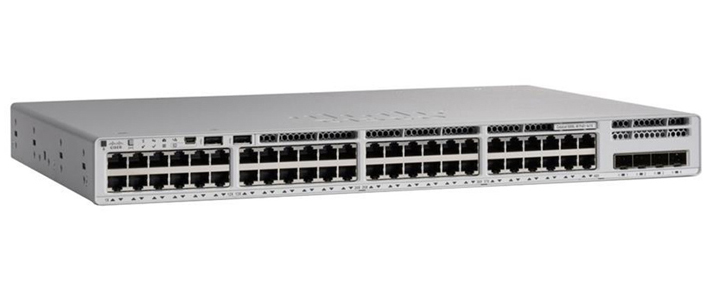
































The Cisco Catalyst 9200L Series Switchesare a powerful and essential component of modern enterprise networks, providing robust connectivity, scalability, and security. These switches are designed to simplify network management while delivering enterprise-class networking for mid-sized businesses and branch offices. In this article, we'll walk you through the Cisco C9200L configuration, covering everything from basic setup to advanced configurations that optimize performance and security.
Introduction to Cisco Catalyst 9200L Series Switches
Prerequisites for Configuration
Initial Setup of Cisco Catalyst 9200L Switch
a. Accessing the Switch via Console
b. Setting up Initial Configuration Using Cisco Web UI
Basic Switch Configuration
a. Configuring Hostname
b. Setting IP Address on Management Interface
c. Creating User Accounts
VLAN Configuration on Cisco C9200L Switch
a. What is a VLAN?
b. Steps to Create and Configure VLANs
Configuring Trunk Ports
Port Security Configuration
Configuring Layer 3 Features
a. Enabling Inter-VLAN Routing
b. Configuring Static Routing
c. Configuring Dynamic Routing (OSPF)
Configuring Switch Stacking with Cisco Catalyst 9200L
Managing and Monitoring the Switch
a. SNMP Configuration
b. Syslog Setup
Best Practices for Securing the Cisco C9200L Switch
Troubleshooting Common Configuration Issues
Conclusion
FAQs
TheCisco Catalyst 9200Lseries is part of the Catalyst 9000 family, built to provide high levels of flexibility, security, and programmability. These switches offer features likeLayer 2/3 routing,advanced securitythroughTrustSec, andautomationusing Cisco'sDNA Center. With a fixed configuration model, they are ideal for businesses looking for cost-effective, scalable, and efficient network solutions.
Before configuring the Cisco Catalyst 9200L, ensure the following:
Console Access: A console cable (USB or RJ-45) and terminal emulation software like PuTTY or Tera Term are required to access the switch's CLI.
Cisco IOS Knowledge: Familiarity with basic Cisco IOS commands will ease the configuration process.
Network Plan: Define your network architecture, including IP address schemes, VLAN assignments, and security policies.
To begin configuring the Cisco Catalyst 9200L:
Connect your PC to the switch's console port using the console cable.
Open your terminal emulation software (e.g., PuTTY), set the connection type toSerial, and enter the COM port settings (speed 9600, data bits 8, no parity, 1 stop bit).
Once connected, you'll be prompted with the switch’s CLI.
Cisco Catalyst 9200L switches offer aWeb UIfor easy setup:
After connecting to the switch via a browser, log in using the default credentials.
Use theInitial Setup Wizardto configure basic settings like hostname, management IP address, and user credentials.
Save the configuration to ensure it is retained after reboot.
Set a unique hostname to identify the switch on the network:
Switch#configure terminal
Switch(config)#hostname C9200L-Switch1
C9200L-Switch1(config)#
To manage the switch remotely, assign an IP address to the management interface:
C9200L-Switch1(config)#interface vlan 1
C9200L-Switch1(config-if)#ip address 192.168.1.10 255.255.255.0
C9200L-Switch1(config-if)#no shutdown
For security, create user accounts with privilege levels:
C9200L-Switch1(config)#username admin privilege 15 secret adminpassword
This command creates an administrative account with full privileges.
AVLAN (Virtual Local Area Network)allows network segmentation by creating isolated broadcast domains within a switch. This enhances security and optimizes network traffic.
To create a VLAN:
C9200L-Switch1(config)#vlan 10
C9200L-Switch1(config-vlan)#name Sales_VLAN
C9200L-Switch1(config-vlan)#exit
Now, assign ports to the VLAN:
C9200L-Switch1(config)#interface range gigabitEthernet 1/0/1-10
C9200L-Switch1(config-if-range)#switchport mode access
C9200L-Switch1(config-if-range)#switchport access vlan 10
Trunk ports allow multiple VLANs to traverse between switches. To configure a trunk port:
C9200L-Switch1(config)#interface gigabitEthernet 1/0/24
C9200L-Switch1(config-if)#switchport mode trunk
C9200L-Switch1(config-if)#switchport trunk allowed vlan 10,20,30
Port security helps limit which devices can connect to the switch:
C9200L-Switch1(config)#interface gigabitEthernet 1/0/1
C9200L-Switch1(config-if)#switchport port-security
C9200L-Switch1(config-if)#switchport port-security maximum 2
C9200L-Switch1(config-if)#switchport port-security violation restrict
To allow communication between VLANs, enable Layer 3 routing:
C9200L-Switch1(config)#ip routing
C9200L-Switch1(config)#interface vlan 10
C9200L-Switch1(config-if)#ip address 192.168.10.1 255.255.255.0
Repeat for other VLANs to ensure inter-VLAN routing.
To configure a static route:
C9200L-Switch1(config)#ip route 0.0.0.0 0.0.0.0 192.168.1.1
OSPF allows for dynamic routing:
C9200L-Switch1(config)#router ospf 1
C9200L-Switch1(config-router)#network 192.168.10.0 0.0.0.255 area 0
Stacking switches allows you to manage multiple switches as a single unit. To configure stacking, first physically connect the stack ports and then use the following commands:
C9200L-Switch1#switch stack-member 1 priority 15
C9200L-Switch1#switch stack-member 2 priority 10
Ensure all switches in the stack are running the sameIOS version.
Simple Network Management Protocol (SNMP) allows you to monitor the switch:
C9200L-Switch1(config)#snmp-server community public RO
C9200L-Switch1(config)#snmp-server community private RW
For logging purposes, set up Syslog to store logs on a remote server:
C9200L-Switch1(config)#logging 192.168.1.100
Disable Unused Ports: Shut down ports that are not in use.
Enable SSH: Use SSH instead of Telnet for remote access.
Implement ACLs: Apply Access Control Lists (ACLs) to control traffic.
C9200L-Switch1(config)#access-list 101 permit ip any any
C9200L-Switch1(config)#interface vlan 1
C9200L-Switch1(config-if)#ip access-group 101 in
Connectivity Issues: Verify physical connections and VLAN assignments.
Port Security Violations: Check for exceeded MAC address limits.
Routing Problems: Ensure ip routing is enabled and routes are correctly configured.
Configuring a Cisco Catalyst 9200L Series Switch involves a mix of basic and advanced tasks such as VLAN setup, trunking, Layer
3 routing, and port security. By following best practices and using Cisco's powerful management tools, you can ensure your network is both secure and efficient. This guide has covered essential configurations, but the Cisco C9200L is highly flexible and can support more complex setups as your network grows.
How do I reset the Cisco Catalyst 9200L to factory settings?
Use thewrite eraseandreloadcommands to reset the switch.
What is the default IP address of a Cisco 9200L switch?
Cisco switches don’t have a default IP. You must configure one on the management interface.
Can I use a web interface to manage the Cisco Catalyst 9200L?
Yes, you can use the Cisco Web UI for basic management tasks.
How many switches can I stack with the 9200L series?
The Cisco Catalyst 9200L supports stacking up to 8 switches.
How do I secure remote access to the switch?
Enable SSH and disable Telnet for secure remote access.
What are the key differences between the 9200 and 9200L models?
The 9200L offers a more cost-effective solution with slightly fewer features compared to the standard 9200 model.
For Cisco product list and quote, please visit: https://www.hi-network.com/categories/cisco or contact us at www.hi-network.com (Email: [email protected])
 Hot Tags :
CISCO Switches
Hot Tags :
CISCO Switches